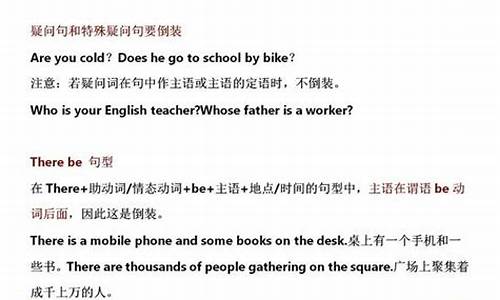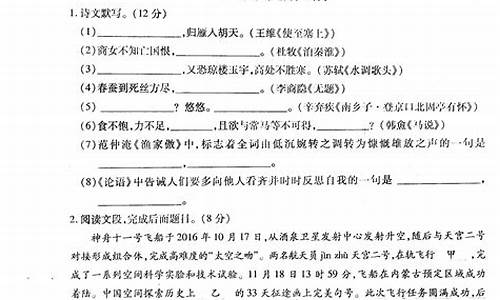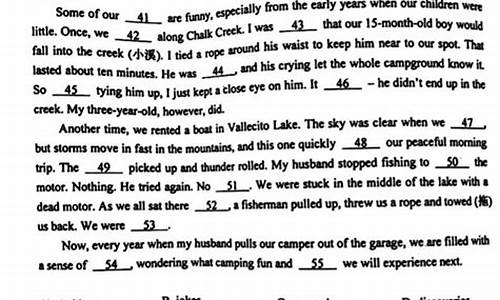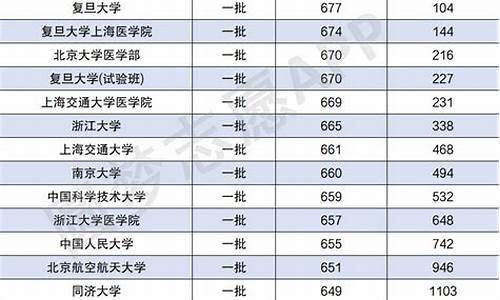英语高考倒装句_英语倒装句在高考写作中的运用
1.关于高考英语倒装句
2.改英语倒装句,应该怎么改?
3.英语语法where倒装句知识点
4.关于一句英文的疑问
5.高考英语语法:2010年高考英语语法精讲三十一 倒装句

回答如下:
可以这样倒装:
Such it had been.
代词such置于句首时,后面的句子要倒装,但主语必须是名词。例如:
Such is the reason. 这就是理由。
Such were his words. 这些就是他所说的话。
如果主语是代词,主谓不倒装。例如:
Such is the man. 他就是这样的人。
关于高考英语倒装句
A small dark-haired girl n red was sitting on the stairs
一个黑发红衣的女孩过去正坐在楼梯上
A small dark-haired girl( who was ) in red /定语从句was sitting on the stairs
On the stairs sitting ( a smalldark-haired girl was in red)
至少缺连词和 谓语
on the stairs sitting 没有这种句型结构
改英语倒装句,应该怎么改?
在倒装句的变化规则中有这样一条: 为了强调一些跟在布吉舞动后的小副词(in/out/up/down/here/there/away/back/long),可以将它们提到句首,然后引起主语和谓语动词完全颠倒,称作完全倒装。如,In came the teacher. Here comes the bus.但主语是人称代词时,只提前副词,主谓不颠倒,如,There he goes.你问的这两句话原句是China lives long. My motherland live long.china相当于人名,当成单数对待,而motherland富有更多的含义在里面,被当成了复数使用。
倒装中还有一条:although和as都有虽然的意思,引导让步状语从句,although引导从句时从句不能倒装,而as引导的从句必须倒装,即Although he is a quiet boy, ...=Quiet boy as he is,...(
即,将从句中的表语a quiet boy提前了,但主谓不颠倒,同时应该注意,表语名次强如果有不定冠词,提到句首后应该省掉)
英语语法where倒装句知识点
倒装是一种语法手段,用以表示一定句子结构的需要和强调某一句子成分的需要。英语的最基本的结构是主、谓结构,倒装就是将这这种比较固定的词序加以颠倒。
将主语和谓语完全颠倒过来,叫做完全倒装。例如:Then began a bitter war between the two countries.(于是两国之间开始了恶战。)谓语began 从主语 a bitter war between the two countries 后面调到前面了。
只将助动词或情态动词移至主语之前,叫做部分倒装。例如:Seldom have we left as comfortable as here. (我们难得像在这儿这么舒服。)助动词have从主语we后面移到主语前面了。
关于一句英文的疑问
《警惕,高考英语陷阱》中有这样一道题:
Little Jim is going to spend his holiday in Paris, _________ lives his uncle.
A. which B. who C. where D. that
分析许多人一看到空格后的谓语动词lives,就以为空格处一定要填一个作主语的词,从而误选B或D。其实,此题的最佳答案应是C,where lives his uncle 为倒装词序,此句可改为 and there lives his uncle 或 and his uncle lives there。类似的如:
He was led to a dark corner, where sat his old father.
他被引进一个黑暗的角落,他的老父亲坐在那儿。
Towards evening we reached the village, where lived her parents.
到傍晚的`时候,我们到了那个村庄,她的父母就住在那儿。
At last we found the spot he told me, where lay a dead dog.
最后我们找到了他告诉我们的那个地点,那儿躺着一条死狗。
为便于理解,请比较下面的倒装句:
Next to it stood a pile of paper cups.
它旁边有一堆纸杯。
In the doorway stood a man with a gun.
门口站着一个手持一枝枪的男人。
In the corner of the room stood a big old chair.
屋角儿放着一把旧的大椅子。
On a perch beside him sat a blue parrot.
在他旁边的栖木上栖着一只蓝色的鹦鹉。
高考英语语法:2010年高考英语语法精讲三十一 倒装句
这是典型的倒装句。倒装句分为部分倒装和全部倒装,此题为全部倒装,即句子的谓语完全置于主语之前。而部分倒装是将谓语中的助动词成分置于主语之前就行了。
典型的全部倒装句型如下:
1,There goes the bell.(正常语序为:The bell goes there.)
2,Away flew the birds.(正常语序为:The birds flew away.)
3,Here comes the bus.(正常语序为:The bus comes here.)
那么到现在为止你应该已经注意到了,全部倒装句用于以下情况:1)当表示运动方向的副词(away, down, up, in, out等)和地点状语副词(here, there等)置于句首时,句子要用全部倒装。
2)表示地点的介词短语位于句首时,句子要用全部倒装。
如:1,At the foot of the hill lies a beautiful lake.(正常语序为:A beautiful lake lies at the foot of the hill)
2,Outside the room sits a little dog.(正常语序为:A little dog sits outside the room.)
典型的部分倒装句型如下:
1,only所修饰的副词、介词短语或状语从句放在句首时, 要进行部分倒装,如:
Only then did I realize the importance of learning English.
Only in this way can you hope to improve the situation there.
Only after he came back was I able to see him.
2, 否定副词及介词短语的否定词位于句首时。高考常考的这类词或词语有:never , not, seldom, hardly, little, nowhere, by no means, in no time等 。
如:1,I have never seen such a beautiful place.
Never have I seen such a beautiful place.,
2,I seldom go to the cinema.
Seldom do I go to the cinema.
3,not until 引导的从句位于句首引起的主句部分倒装
如: Not until his mother came back did he finish his homework.
He didn’t finish his homework until his mother came back.
4,在 hardly/scarcely/…when; no sooner…than; not only … but also;so...that; such…that..的倒装句中,前倒后不倒.
如:(1) Hardly / Scarcely had he fallen asleep when aloud knock at the door awaked him.
(2) No sooner had I reached the station than train moved.
(3) Not only is he interested in football but also he plays it well.
(4)So hard does he work that he has made great progress in English.
完。
《2010年高考英语语法精讲三十一 倒装句》由留学英语组我整理(www.liuxue86.com)。本内容整理时间为05月12日,如有任何问题请联系我们。
全部倒装
1.由here, there引起,谓语通常用 be, come, go
Look ! Here comes your sister. There goes the bell.
2. 由介词短语引起,谓语通常用be, stand, lie, live, live, sit, come, go, rise
Along the wall stand four big chairs.
At the top of the hill lay the dying soldiers.
3. 由up, down, on, in, off, away, out, back引起,谓语通常用come, go, run, rush, fly
Out rushed the boy.
Down came the rain and up went the umbrellas.
4.以上情况主语如果是代词,主谓不倒装
Here?s your watch. (Here it is.)
Up it went.
5.由个别副词引起,谓语通常是be, lie
North of the city lies (is) a railway.
6. 由such引起, 谓语通常用be
Such is what he said. Such are his words.
部分倒装
指谓语的一部分放在主语之前而引起的倒装,通常是助动词或情态动词提前或连系动词提前
1. 由never, hardly, seldom, little, not until引起
Seldom did he make any mistakes.
Not until yesterday did I receive his letter.
2. not only?but also连接两个单句时,前面的倒装
Not only was she working hard, but also she was very polite.
3. neither?nor连接两个单句时,两个句子都倒装
Neither is he studying, nor is he working.
4. no sooner?than, hardly (scarcely)?when
No sooner had we got into the room than the telephone rang.
5. 由only + 状语, so + adj. (adv.) 引起
Only then (Only at the age of 18) did he realize the importance of the problem.
6. 由as引起
Child as he is, he can work out the problem.
7. 虚拟语气的倒装
Were I you, I would work harder.
Had you come yesterday, you would have known that.
Should it rain tomorrow, you wouldn?t leave.
so (neither, nor) + be (do, have, 情态动词,助动词)+ 主语
You should work harder and so should I.
She hasn?t been to Berlin and nor have I.
--I went to the zoo yesterday.
--So you did.
--She is a tailor.
--So is she. / So she is.
《2010年高考英语语法精讲三十一 倒装句》由留学英语组我整理(www.liuxue86.com)
声明:本站所有文章资源内容,如无特殊说明或标注,均为采集网络资源。如若本站内容侵犯了原著者的合法权益,可联系本站删除。












